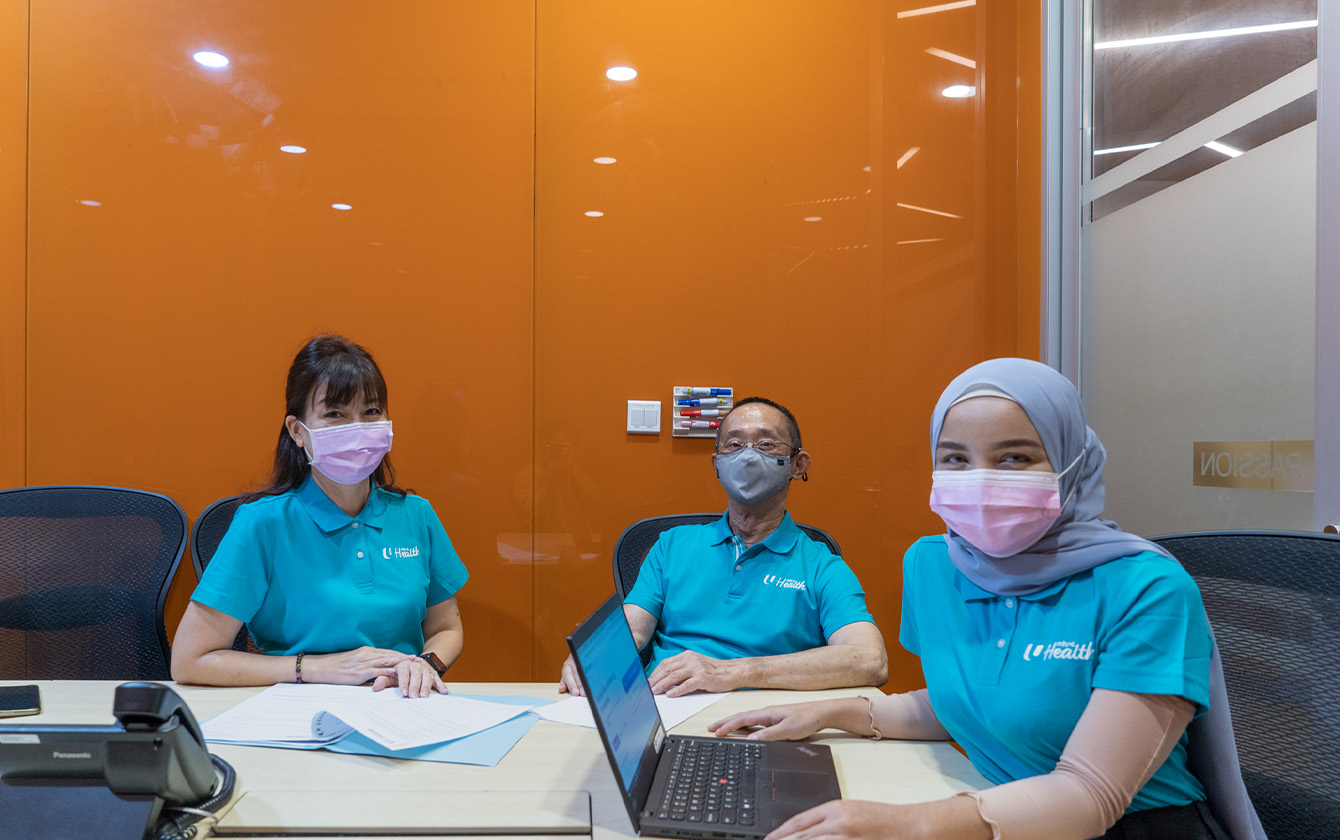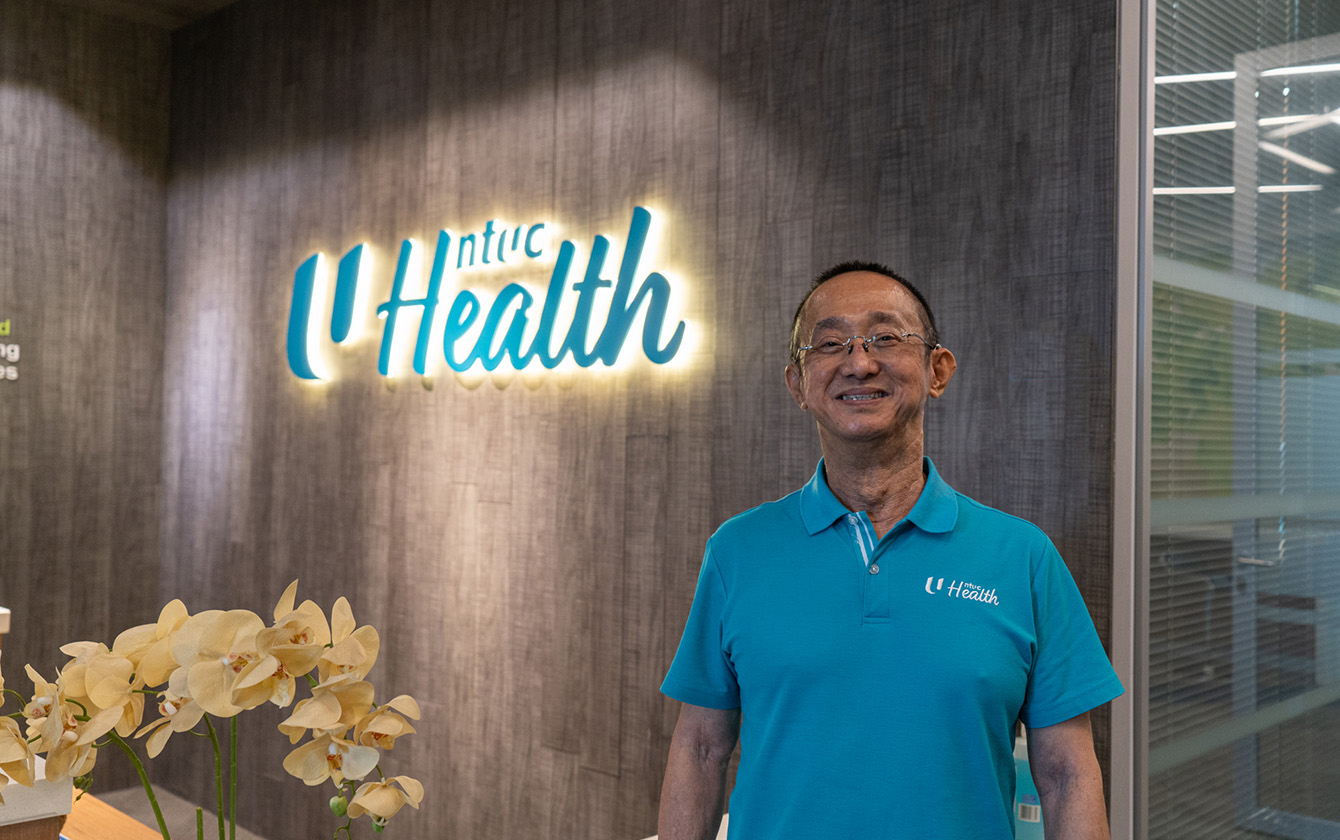

June 2022 Issue: Co-operator Newsletter Quarterly Issue 2022
Faces of Co-operators: Mature Career Switcher - Chong Ooi, A Senior Care Coordinator At NTUC Health

Chong Ooi was working as a purchasing officer in Jakarta, Indonesia when he received news in 2012 that his mother was diagnosed with dementia. Without batting an eye, he stepped away from his job, returned home, and began taking care of her, joining crusades of “new” caregivers who face this cruel reckoning.
In Singapore, 1 in 10 adults above 60 years old suffers from dementia. That’s 82,000 people in 2018 and this number is projected to skyrocket to 152,000 by 2030.
Having no experience with caregiving for people with dementia, Mr Chong struggled initially. The demands of caregiving took its toll, he shares in Chinese. “My mother always asked me for money,” he recalls. “She’d forget that she had gone to the market.” At her worst, she would repeatedly open the door to his room and wake him up at night. Mr Chong was eventually diagnosed with depression and had to resort to taking medication to cope.

When his mother’s condition stabilised two years later, Mr Chong, who had turned 62, was ready to return to the workforce. But transitions can be difficult, especially if you feel close enough to be a parent to almost everyone in the workplace. For Mr Chong, countless job applications came unanswered. And those that replied were polite rejections.
However, Mr Chong did not give up. He was, after all, part of a growing tribe who reinvents themselves after 50. Heeding his sister’s advice to pivot to the eldercare sector, he took up courses to upskill himself, which in turn empowered him to better take care of his mum as well as (his father who was also diagnosed with dementia in 2018). Thanks to a career consultant from the National Council of Social Service, Mr Chong eventually found his footing at NTUC Health where he has been with for eight years and counting.
With his experience of caring for both his parents with dementia, Mr Chong is an asset to the team. “As a senior care coordinator with the Home Care team, I am the primary liaison between NTUC Health and our clients. Besides relaying information or providing service advisory to them, I sometimes perform home visits to better evaluate the delivery of care rendered by our staff too,” Mr Chong explains.

At NTUC Health, Mr Chong also has many opportunities to pick up new digital skills and mentor others. One of his youngest colleagues in the team is fellow Senior Care Coordinator, 26-year-old Shermin Loy. Mr Chong said, “There is a lot of mutual learning involved, and I learn a lot of new things from them as well.”
If anything, he seems to hint: Your job doesn’t define you, your experience does, so make use of that to empower others. Below, read our full interview with Mr Chong.
Ler Jun: Tell me more about yourself.
Chong Ooi: It has been close to eight years since I joined the co-operative in 2014 as a senior care coordinator at NTUC Health.
LJ: What is your role and what are your responsibilities at NTUC Health?
CO: As a senior care coordinator, I am the primary liaison between NTUC Health and our Home Care clients. Besides relaying information and providing them with the necessary support, I perform periodic home visits to check on clients and gather feedback on the service rendered by our staff.
LJ: We understand that you were previously working in Jakarta as a purchasing officer. What made you come home?
CO: In 2012, I received news that my mother was sick and diagnosed with dementia. The helper then was not able to cope with the demands of looking after my mother. Hence, I decided to return home to better care for her. In retrospect, that proved to be the right move because in 2018, my father was subsequently diagnosed with dementia too.

LJ: How then did you transit into the eldercare sector?
CO: Two years after returning home, I started actively applying for jobs similar to my previous role as a purchasing officer. However, I was already 62 years old and you could imagine the difficulty for someone my age to find a job. I remember sending out over 100 applications and receiving rejections or no responses.
My sister came up with a brilliant idea and suggested for me to scour for jobs in the eldercare sector since I had experience taking care of my mother.
I then decided to take up a course at the Lifelong Learning Institute (LLI) to upskill myself when I then met Mr Low Moon Chong, a career consultant with the National Council of Social Service, who introduced me to NTUC Health.
In a way, joining NTUC Health was serendipitous.
LJ: We understand that both your parents have dementia and are wheelchair-bound. How has being a caretaker helped you at NTUC Health?
CO: Being a caregiver is never easy, there were definitely periods where I struggled. I was initially overwhelmed as I did not know how to manage and care for elderly with dementia. I recall being very stressed by the tantrums. My mother would repeatedly ask me for money and constantly come into my room to ask for the same thing over and over again. I broke down and at one point, I was diagnosed with depression and had to be put on medication.
Thankfully, I had my siblings to help me. And through the courses at LLI, I learned to handle these situations with grace.
LJ: Were any of the situations your clients faced any similar to what you have experienced at home?
CO: They are different and it can be challenging, however, I leverage my experience of looking after my parents to look after the clients.
LJ: What were some of the challenges you faced when caring for the elderly with dementia? How did you go about overcoming them?
CO: There is a steep learning curve when interacting with people with dementia. Because they are forgetful and they do not recall what they say or do and they cannot be blamed. You will be reprimanded, you will cry, you will stumble and fall. But you also will have to also get back up on your own to learn from your mistakes to adapt and respond tactfully with the clients.
LJ: At NTUC Health, you also had opportunities to mentor others. What are some of the lessons you shared with your mentees?
CO: I don’t consider myself a mentor. We all learn from one another. Even the young ones in their 20s have something useful that we older ones can learn from as well. I guess one quality I have always emphasised is to have empathy by understanding that everyone has different opinions and we have to listen actively to understand from different perspectives. Another important attribute is the need to build rapport with clients and not to take everything too personally.
LJ: What did joining the co-operative taught you?
CO: Being empathetic and having open communication go a long way.
LJ: What do you find most satisfying about your job at the co-operative?
CO: I like that I have good working relationships with my superiors and colleagues. They are respectful and responsible; and we would help one another out. I am really happy working here.

This interview has been translated, condensed, and edited for clarity.
Photos and Words by Sng Ler Jun



